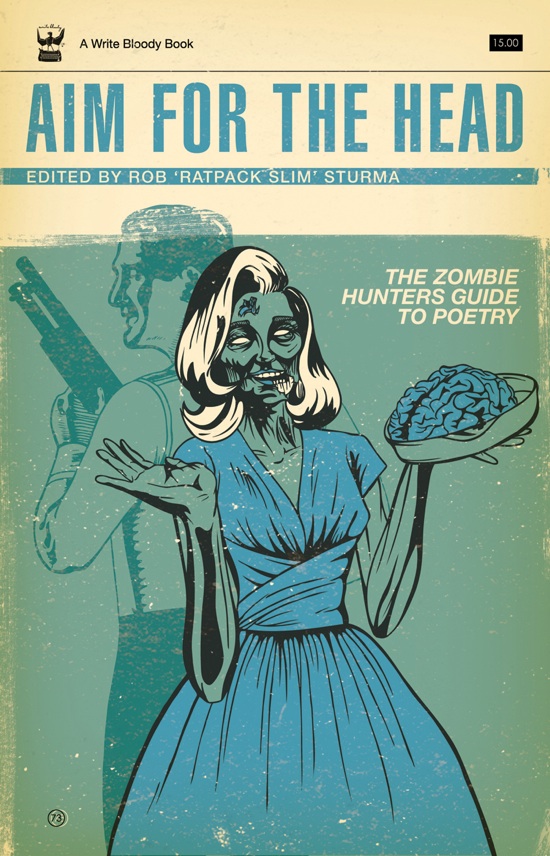
By Mary Nicholas, News Editor
From the Halloween special on “Community” to Jane Austen’s classic Pride and Prejudice to the several heart-racing HvZ battles on our own quad, zombies are rapidly penetrating the creative fantasies of our society.
The rise of the modern cultural obsession with zombies even parallels the exponential popularity of vampire protagonists, such as those worshipped in Twilight.
But unlike Stephanie Meyer, who paired the flawlessly homicidal Edward Cullen with the world’s least exciting zombie, Bella Swan, IWU alumna Megan Thoma ’05 is not afraid to tell it like it is in regards to romance among the undead.
“Let’s play zombie sex game. You eat. I’ll moan. We both feel nothing inside,” Thoma writes in Sexy Zombie Haiku #2, which was recently quoted in the New York Times.
Channeling creativity through zombie imagery is all the rage, but it’s just one of the self-described “eclectic” topics among Thoma’s compositions. In her writing she aspires to combine these “kooky ideas” with “non-traditional forms” so that “some sort of truth from humanity rises from the work.”
This process is her tried and true recipe for the graphic eloquence she has been acclaimed for. Dr. Michael Theune of the English Department worked with Thoma when she attended IWU as an education and English writing double major and offers high praise for her poetry.
“Thoma creates quick poems that, like photographs, dazzle with instant image and insight. It’s no surprise to me, thus, that she’s been drawn to haiku,” Theune said of her poetry’s success in the Times.
“Sexy Zombie Haikus #1 and 2” are featured in a comprehensive anthology of zombie poetry titled Aim for the Head. Thoma’s poetry, though, is not all confined to the pages of a book.
Providence Slammaster and a representative at both national and worldwide slams, Thoma has also made a name for herself in the verbal poetry circuit after watching performances for nearly a decade.
Her advice for prospective slammers is to “Go and watch. For a long time. Slam is an incredibly accessible art form, which is one of the things that makes it unique and special, but it also floods the scene with mediocre art. And though this annoys some, it inspires others.”
And last summer Thoma, armed with years of experience, a variety of poems about everything from moon rocks to her BFF Michelle Obama and her trusty zombie baby, took her slam show on the road.
For IWU students currently living in the Bubble, national recognition for one’s talents and zombie parenthood may seem like an unreachable dream.
Fortunately, zombie babies are available for purchase online. And IWU students can share their own creative efforts writing through Tributaries, one of Thoma’s campus legacies.
Thoma’s labors with the literary magazine added a serious level of organization, a conversion which, according to Theune, “did not stifle the group’s creativity, but released it.”
Tributaries even holds the work of several past and current zombie poets such as “Till Death Do Us Part,” composed by senior Nick Bruno.
Thoma is currently brainstorming ways to bring zombies to her own school, and her ideas go beyond the occasional morbid word problem.
“For the last year I’ve toyed with the idea of teaching a ‘How to survive the zombie apocalypse’ course during our weekly elective time,” she admits. I’m not sure what a syllabus would look like, but I’m seriously trying to piece it together!”
To clarify she adds, “I don’t think the dead are going to mysteriously come back to life, but I do think that the recent ideas about some sort of medical epidemic infecting people is a whole lot more probable.”
And with all the mythology surrounding 2012, perhaps her students will encounter an occasion to apply her lessons. But Thoma hopes to avoid such catastrophe. “Despite all the movies I’ve seen and books I read, I don’t think I’d survive long.”
But fear of infection is only one element of zombies to ponder as you lie awake at night. “There is no real way to access its emotions or thoughts, and that’s scary for us,” Thoma said.
“I think there are so many parts of our culture that can dull our emotions and thoughts making the analogy between humans and zombies come pretty naturally,” she adds.
And really, a population impervious to movie-violence and that sleepwalks without Starbucks in the morning doesn’t offer too much resistance to a comparison with the undead.
